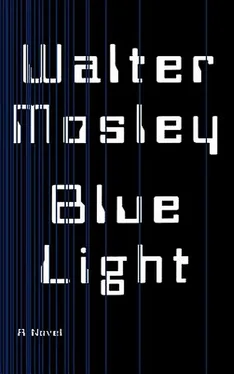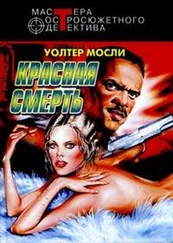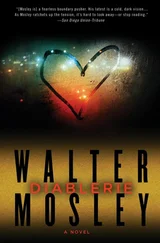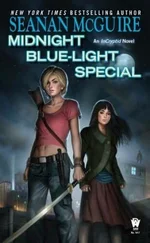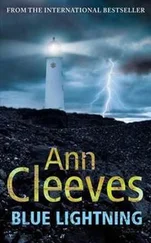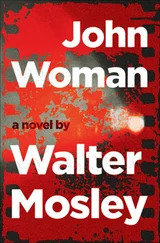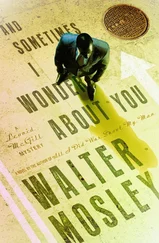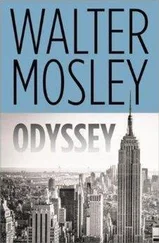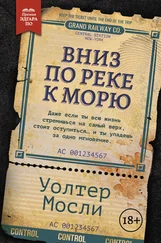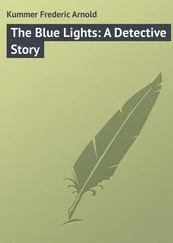When the greeting was over, Bones rummaged around behind the water tower and came out with a ladder made from tree-fabric rope and thick branches. He set it up against the side of the stone container.
“Ho, Last Chance,” he cried. “Climb up there and make yourself useful.”
As I scaled the rickety ladder, the deer became agitated. They ran back and forth with excitement. Some even reared on their hind legs with anticipation.
Upon reaching the last rung, I could see down into the big container. It was at least nine feet deep. The sides were blackened, but the water was crystal-clear.
“Pass up the first bucket, Miles and Miles,” Thrombone said.
The deer were running back and forth across the small clearing, stopping at the end of each circuit at the cistern before dashing away again.
The heavy bucket was passed up, and I removed the thick green fabric cover. It had certainly been used as a chamber pot, but it also contained tree needles, bark, and fist-sized globs of thick golden tree sap.
“Pour it in,” Bones said. “Pour it all in.”
I emptied the contents as well as I could into the water and then I submerged the bucket, washing out whatever was stuck to the sides.
“Now hand it back down! Come on! We don’t have all year!”
I was passed up all four buckets in succession. After they were all emptied, I was given the long pole and told to agitate the water as though churning butter. I’d never used a churn before, but I’d seen it done on TV.
We each took a turn mixing the concoction, and then we each took another turn.
I was afraid that the deer would lick the foul substance from the sides of the cistern, but they did not. They kept up their running, though more slowly after a while.
After a couple hours of churning, Juan climbed up the ladder to examine our work. He nodded and told us to pass up the buckets one at a time. He filled each one and passed them back down to us.
We carried the buckets to the upper clearing, spilling a good deal along the way. Juan led us to a spot near the edge of the plateau. He took from his pouch a tiny seed and a small twig, maybe eight inches long. He poked a hole in the soft earth and dropped in the seed. Then he stuck the twig in the ground to mark the planting.
“Keep pouring until I tell you to stop.”
It was hard work carrying buckets of water from the lower to the upper clearing. While we did, Bones planted more seeds and marked them. Each seed was planted about fifteen feet from its nearest neighbor. After about two hours we’d poured twelve buckets of water on each seed.
“Aren’t we going to drown them?” Gerin Reed asked.
“Can you drown a mackerel with the sea?” Thrombone replied.
A half-moon crowned the night by the time we were through. Bones had made a fire that was hot and bright from some tarlike substance that I didn’t recognize. We were all glad to sit after our exertions of the day.
“I have your salaries, gentlemen,” Bones announced.
During that whole day of work not one real discussion occurred between us. There was no feeling between us. Just separate bodies and solitary minds going through the motions of our lives. No one knew what we were doing there, or anywhere.
Then Juan Thrombone produced four small tree-cloth pouches from his larger one. He handed us each a pouch.
Inside mine I found a small dark stone that was cold and slightly moist to the touch. An orange lichen or fungus of some sort was growing along one side.
“A drop or two of water each week and keep it in the pouch. When the moss covers the whole of the stone, scrape it into a bottle of water and let it sit for at least a year.” He pulled out his canteen made from hide and continued, “And then this strong brew have you.”
He passed the bottle around, admonishing us to take only a mouthful. He needn’t have bothered with the warning, though. It had to be at least 150 proof. It was so potent that I had a hard time keeping it down.
The evening had been cool before that sip. But the warmth of the liquor along with the heat of the tar flame warmed me from the inside out. The moon itself seemed to be a source of heat. I loved that moon and I loved the men I’d worked with that day.
I smiled at Mackie Allitar and he saluted the gesture.
My vision began to play tricks on me. The woods around us, lit by the flickering fire, were as bright as day, but the shadows were impenetrable black. In and out of this absolute dark and light moved deer and bear and Juan Thrombone. I had the urge to join them, but when I tried to rise I ended up flat on my belly — laughing.
For a while I struggled with gravity. I was about as coordinated as an infant. I called out and my friends did too. I remember looking up at the moon. I saw the silhouette of a hand reaching for the orb but couldn’t tell then whether it was my hand or not. And then I was asleep.
The dreams were not mine — not completely, at any rate.
I was the poor boy from Kentucky coming in on his cheating wife, offering her a rose. I was a cop branded by the pain of death, sitting in the dark with a man whose name was an alias. Mackie was sitting next to me in an otherwise all-white classroom. He scared the kids so much that they left us alone.
We moved thus back and forth between one another’s memories and desires until we were the best of friends, brothers beyond blood.
I cried when I felt the jangled pain in Miles Barber’s face.
Gerin sat with me as I bled on the floor of the People’s Warehouse.
We climbed mountains together and cried over our greatest losses. We shared our inner fears and lusts. We weren’t alone for the first time that any one of us could remember.
When I felt the light of morning on my face, it was with disappointment. Never had I felt the intimacy of that night of dreams. I didn’t want it to end.
I was covered with a thick tree-cloth blanket, as were the rest of my friends. Juan Thrombone was gone.
I sat up. I could see that my friends were rousing also. Beyond them was the beginning of a new forest. Fifteen young firs had grown at least eighteen inches in the night.
“Hey!” I shouted. “Get up! Get up!”
“How could this be?” Miles Barber wondered out loud.
Gerin Reed was shaking his head.
We were all chattering and amazed when Juan Thrombone appeared among us. I guess he just came out of the woods, but none of us noticed because we were too busy sharing our new friendship and our surprise.
“No more talk, chatty boys,” Thrombone said. “Man your buckets, water your trees. You’ll have no breakfast until their roots are satisfied. It is the future of civilization you hold in your silly dreams.”
Gerin Reed taught us a coal miner’s song that he’d learned from his grandfather. We alternated singing and talking about our dreams.
We doused the saplings, and they grew just that fast. By the end of the day they were five feet apiece. By the end of four days they were twenty feet high.
While we worked, Bones fueled us with venison stews full of wild mushrooms and greens from the woods. Each night we drank stone liquor and passed out and into one another’s dreams.
On the fourth morning we went back through the grove of god trees. It wasn’t nearly so hard, because we held hands and sang.
Everything changed in those few days. Ex-Detective Barber’s pain subsided and his scars, though still there, lost their red rawness. Mackie Allitar gained at least forty pounds, and every ounce seemed to be muscle. Gerin Reed’s eyes became clear and focused, and his perpetual melancholy lessened until it finally disappeared.
I was different on the inside also. I was happy. For the first time I had real friendships. For the next week or so the four half-light men of Treaty were always visiting and talking, playing catch or just taking walks in the woods. Gerin taught Mackie how to fish, and Miles Barber showed me how to write in shorthand.
Читать дальше
